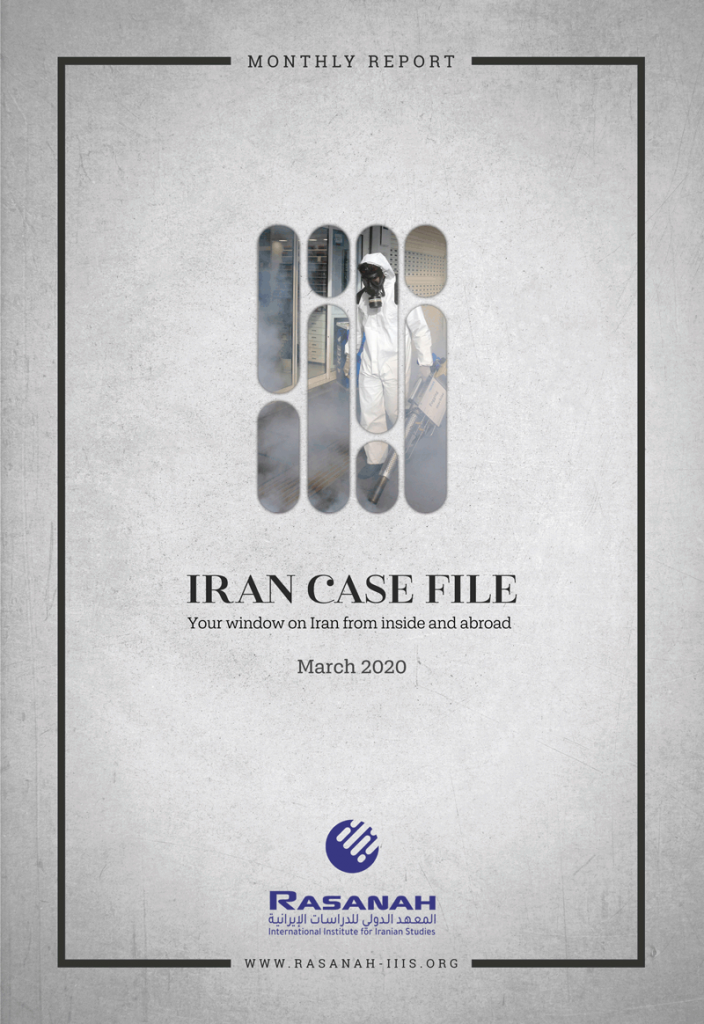The International Institute for Iranian Studies (Rasanah) has issued its monthly Iran Case File for the month of March 2020, reviewing the latest developments in the Iranian arena. The file provides those who are interested in Iranian affairs comprehensive insights and an in-depth analysis of Iran. It is divided into three main parts: Internal Affairs, Arab Affairs, and International Affairs.
Internal Affairs: The Ideological File explores the coronavirus outbreak in Iran as one of the hardest hit countries in the world, especially at Iranian holy sites. At the very beginning of the crisis, the hardliners (pro-Velayat-e Faqih clerics) refused to close shrines and tombs. After the government issued a decision to close the shrines, the pro-Velayat-e Faqih clerics suddenly shifted their position from rejecting the closure of shrines to supporting the decision. Later, some people attempted to storm the shrines in protest at the closure.
The Political File explores Iran’s attempt to politicize the coronavirus pandemic, accusing the United States of being responsible for creating the virus. This is what was stated by the Iranian Supreme Leader Ali Khamenei. As a result, Iranian activists filed a petition, accusing Khamenei and Rouhani of being responsible for the spread of the virus as they delayed announcing the spread of the virus and did not take precautionary measures for political reasons. The file also highlights Khamenei’s exploitation of the suspension of the Iranian Parliament to pass the general budget for 2020-2021 as many of its members have been infected with the virus. The Parliament had rejected the budget bill several times since last December due to the unrealistic figures of the budget and the dependence of budgetary items on an increase in tax revenues, which is an unrealistic goal given the economic depression which Iran is suffering.
The Military File discusses how the IRGC has been assigned to combat coronavirus in order to change the negative public perception towards the IRGC; in addition to the IRGC’s echoing of Khamenei’s remarks, from a military perspective, that the coronavirus is a biological war waged by the United States against Iran.
In the Arab arena, Iran continued its efforts aimed to maintain influence in Iraq despite mounting popular opposition against the Iranian presence on Iraqi soil.
Iranian efforts for the time being revolve around pushing Iraqi militias to attack the United States in order to control the political arena and facilitate the exclusion of political currents which reject Iranian interventions in Iraq. This is in addition to picking a new prime minister for Iraq who is not opposed to the implementation of Iran’s agenda, but rather supports it.
As for the international arena, Iran’s efforts focused on showing that US sanctions hinder its efforts to combat the spread of the coronavirus on Iranian soil and that the US sanctions represent medical terrorism. In its campaign, Iran’s Foreign Minister Mohammad Javad Zarif carried out diplomatic maneuvers to influence European countries and international organizations. The United States also called on Khamenei to use Iran’s foreign exchange reserves to tackle the impact of the crisis instead of Tehran’s militant activities and waiting for the arms exports embargo imposed on Iran to be lifted in order to spend the country’s foreign reserves on purchasing weapons from Russia and China. Finally, Moscow reiterated the Iranian role in the Astana talks for fostering peace in Syria. This comes as it has been working to reduce the Iranian role in the Syrian crisis over the past few months following the Turkish incursion into the Syrian city of Idlib.


